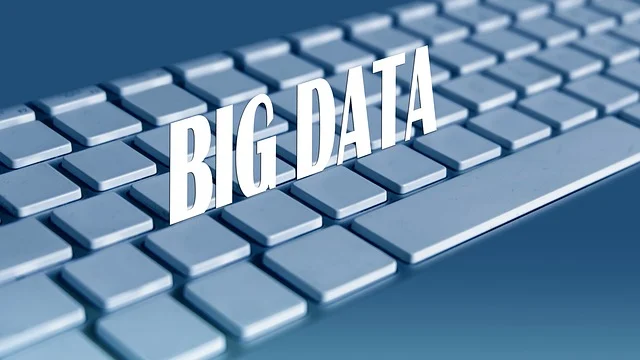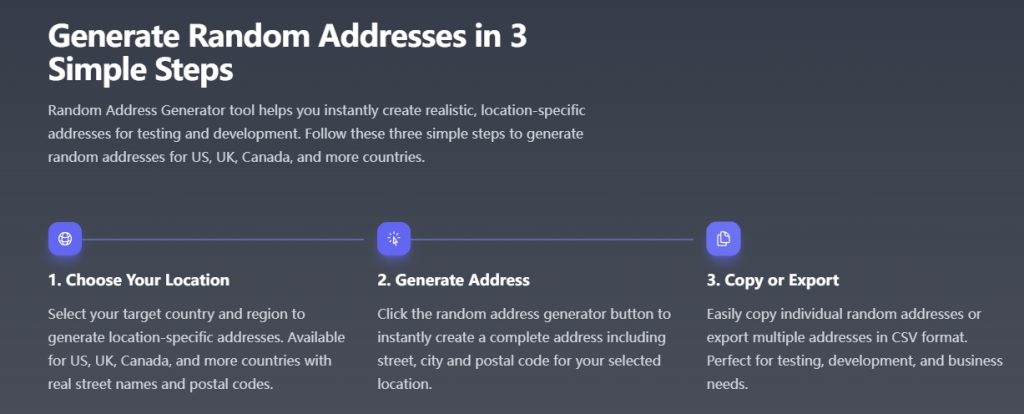In the fast-evolving landscape of IT development, tools that automate and streamline tasks are essential. Among these tools, the random address generator emerges as an unsung hero, finding utility across a diverse array of applications. Far from being just a quirky novelty, it serves as a critical asset for developers, testers, and even data scientists who seek to create robust and efficient systems.
Addressing the Challenge of Test Data Generation
In software development, realistic test data is a cornerstone of quality assurance. However, crafting this data manually can be time-consuming and prone to errors. This is where random address generators become invaluable. By generating fictitious yet realistic addresses, these tools provide developers with an efficient way to populate test databases, simulate user inputs, or verify address validation algorithms.

For instance, a developer working on an e-commerce platform can use a random address generator to test shipping modules across various formats, postal codes, and regions. Tools like Random Address Generator simplify this process, enabling teams to quickly generate datasets that mimic real-world scenarios without compromising user privacy.
Enhancing Privacy and Security Testing
Data privacy concerns are at an all-time high. When handling sensitive user data, developers must ensure that their systems are secure against breaches and leaks. During testing, using actual user addresses poses a significant risk of exposure. Random address generators mitigate this risk by offering an alternative that preserves realism without involving real-world data.
Moreover, cybersecurity teams can leverage these tools to test how systems respond to various address inputs, including edge cases such as malformed or non-standard formats. This proactive approach strengthens systems against potential vulnerabilities and enhances their reliability.

Revolutionizing Machine Learning and Data Science Applications
Machine learning models thrive on high-quality, diverse datasets. However, sourcing this data ethically and efficiently often presents challenges. Random address generators fill this gap by providing diverse address data for training natural language processing (NLP) models, location-based recommendation engines, and geographic clustering algorithms.
Consider a scenario where a data scientist is building a model to predict delivery times based on location data. By feeding the model with a dataset generated using a random address generator, they can simulate a variety of real-world delivery scenarios, improving the model’s predictive accuracy.
Streamlining Localization and Internationalization Testing
In the global market, applications must cater to users from diverse geographic regions. This demands extensive testing for localization and internationalization. Random address generators offer support for multiple countries, enabling developers to test interfaces, address formatting, and geolocation services without needing access to actual addresses from each region.
For example, an application designed for global use may need to display addresses in country-specific formats, such as the United States’ ZIP codes or Germany’s postal codes. Using a tool that generates addresses for different countries ensures the application meets these requirements seamlessly.

Supporting Educational and Training Programs
Beyond development and testing, random address generators find applications in education. Coding bootcamps, IT training sessions, and even university courses use these tools to teach students the intricacies of data manipulation, database management, and software testing. By integrating realistic datasets into their curriculum, instructors provide students with hands-on experience in tackling real-world challenges.
Advanced Features and Customization
Modern random address generators, such as the one available at Random Address Generator, often include advanced features that cater to niche needs. These tools allow users to specify parameters such as country, state, city, or even address type, offering unparalleled flexibility. Such customization ensures that the generated data aligns perfectly with the requirements of a specific project.
For example, developers working on a location-based service for California can generate addresses exclusively within the state, ensuring targeted and meaningful testing. Similarly, e-commerce platforms expanding to international markets can generate addresses tailored to each country they plan to serve.
The Importance of Ethical Considerations
While the utility of random address generators is evident, it’s equally important to address ethical concerns. Developers must ensure that these tools are used responsibly, avoiding scenarios where generated data could be mistaken for real information. Transparent labeling of test data and adherence to industry standards are key to maintaining ethical integrity.
Moreover, as artificial intelligence continues to advance, the potential for generating hyper-realistic data grows. Ensuring these tools are not misused for fraudulent purposes is a collective responsibility for developers and the broader tech community.

Future Trends and Innovations
The role of random address generators will only expand as IT development continues to evolve. Integration with APIs for seamless inclusion in CI/CD pipelines, enhanced support for non-standard address formats, and incorporation of AI-driven context-aware generation are just a few possibilities on the horizon.
Additionally, as smart cities and IoT networks proliferate, the demand for tools that simulate real-world data, including addresses, will grow. Random address generators will play a pivotal role in testing and refining these advanced systems.

Conclusion
From software development to data science, the random address generator has proven itself to be more than just a utility tool. Its ability to provide realistic, customizable, and secure address data makes it indispensable in the modern IT landscape. For developers, testers, and data scientists seeking to enhance their workflows, exploring the potential of tools like Random Address Generator is a step toward greater efficiency and innovation.
By embracing this versatile tool, IT professionals can focus on solving complex challenges while leaving the tedious task of data generation to automation. As technology continues to advance, so too will the applications and significance of the humble random address generator.
